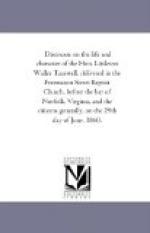“That there may have been something in the original organization of his mind or temperament of his character, that qualified him, in a preeminent degree, for cool, dispassionate, profound, and vigorous exertion, I will not take upon me to deny; but that he owed much more of his excellence to that secret and persevering labor to which he had so nobly submitted, and by which he had given additional tone and power to his mind itself, I am perfectly convinced. His mind did, now, indeed, appear in itself the superior one; it had such a power of compression and expansion, of versatility and strength, that it seemed capable of anything and everything that he pleased. It was astonishing with what rapidity and effect he would shift the color, shape, and attitude of the same object as the emergencies of his argument required. With what closeness and unanswerable cogency he would maintain truth! and with what illusion and almost irrefutable sophistry he would disguise and metamorphose error! At the first sound of the trumpet he could draw a larger body of forces into the field in favor of an erroneous position than his adversaries could in favor of a correct one; and even when on the wrong side, which he seemed just as willing to be as he was to be on the right, he was generally astute enough to drive his adversaries into straits and keep the field himself in token of victory. Indeed the spirit of enterprise and the consciousness of his strength led him generally to prefer the wrong side to the right, and to support error with more vivacity and appearance of enjoyment than he did truth. His fault seemed to consist in the abuse of his strength; in that laxity of colloquial morals (if I may use the phrase) of which I have, just spoken, and which led him to triumph, with equal pleasure, in every victory, right or wrong.
“There was, however, something still more unfortunate in this bold and commanding character, but which I believe I should never have discovered had I not endeavored to take the place of the public towards him, and judge of him as I have seen them judge of others: I mean an apparent frigidity of manner which I feared the world would consider as the evidence of a cold and sordid heart.
“The man who is in possession of such talents as Sidney’s, is in possession of a most dangerous gift; and it behoves him to walk before the public with a circumspection proportionate to the superiority of those talents. Exorbitant power, whether intellectual or political, naturally begets distrust and jealousy in the good as well as envy in the wicked; and it requires on the part of its possessor a constant display, not only of the most scrupulous integrity and sacred purity on every occasion, great or small; but a constant display also of the most disinterested generosity and public spirit, to give such a character even fair play before the world. People must be satisfied that such an one will not abuse his power to their injury, and sacrifice their interests to his own;




